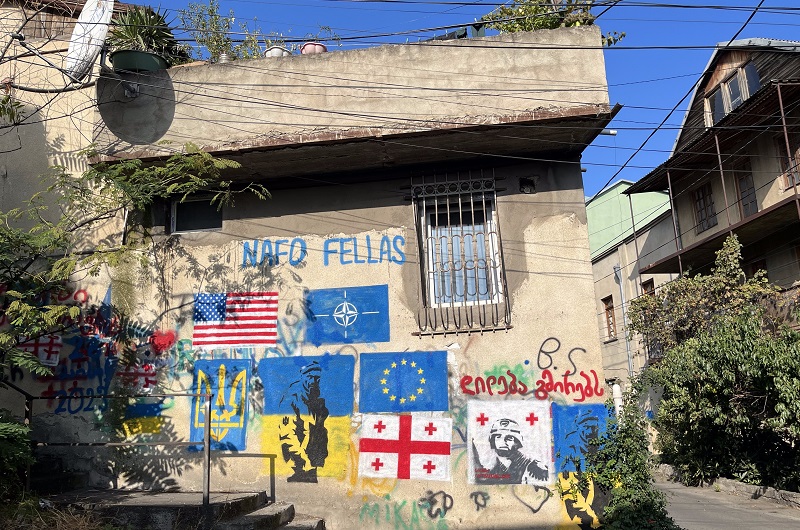
- This event has passed.
WORKSHOP: Vision(s) of Post-war European Security
January 22 @ 3:00 pm - 5:30 pm UTC+1

Picture: Tbilisi, Georgia (c) Tsypylma Darieva
Workshop at the Centre for East European and international Studies (ZOiS)
22 January 2025 – 15:00 CET Online
Organisation: ZOiS, KonKoop
Convener: Nadja Douglas
Europe’s security order is currently dysfunctional. Russia’s war of aggression against Ukraine has fundamentally changed regional and local security dynamics. The continent is afflicted with a fragmentation of notions of order and overlapping military and economic blocs. At the same time, increasing inter- and intra-societal tensions and individual fears are contributing to perceptions of growing insecurity. Instead of co-operation and dialogue, conventional and nuclear rearmament, mutual deterrence and border closures are back on the agenda. Security perceptions on the ground have been constricted and nationalised, and the vision of an overarching European cooperative security has further been weakened.
For the time being, pan-European cooperative security is being held hostage by Russia until it returns to the principles of international law enshrined in the OSCE Helsinki Final Act and the Charta of Paris. Following an end to the war in Ukraine, the question of how to ensure peaceful coexistence and reorder European security will inevitably come up. The need to provide security guarantees for Ukraine (and other non-NATO states) will be another important issue. To stabilise and improve European security in the medium to long term, a regional setting will be necessary.
Despite many international constraints, the present interim period could and should be used to ponder ways of restructuring European security. On a wider regional level, the interests of the most-affected ‘in-between’ (i.e. non-NATO) states should be given priority. This workshop will therefore concentrate on the regional and local levels. Recognising that politicians and academics are not the only experts on the politics of security, we take again a vernacular approach and give equal consideration to security vision(s) and needs from below (i.e. those of civil societies, populations, ‘ordinary’ citizens).
This workshop is the last in a series of workshops organised as part of the KonKoop In:Security topic line, which aims to question state-centric notions of security and insecurity in times of war and conflict and to dismantle Eurocentric perspectives.
Key questions to be discussed:
• What are the most fundamental challenges to European security today, bearing in mind regional and local dynamics? Which challenges may become significant after an end to the Russian war in Ukraine?
• Are security perceptions and visions compatible at the European policy, regional and local levels?
• What types of regional integration formats are conceivable?
• What are the security needs of states and societies in the wider OSCE region?
• What role does civil society currently play in discussions of European security?
• What lessons learnt from past civil society engagement in the context of cooperative security are relevant for future deliberations?
With:
– Yevgeniya Gaber, George C. Marshall European Center for Security Studies, Kyiv/Garmisch-Partenkirchen
– Alexandra Matas, Geneva Centre for Security Policy
– Kuba Bieniasz/ Piotr Winiarczyk, We Are Monitoring Association, Warsaw
– Alexandra Dienes, FES Regional Office for International Cooperation & Peace, Vienna
Summary:
Russia’s war of aggression against Ukraine has fundamentally changed regional and local security dynamics in Europe. In the context of current debates around a potential end to the war in Ukraine, the question of how to ensure peaceful coexistence and reorder European security has come up again. The need to provide security guarantees for Ukraine (and other non-NATO states) is an important issue in this context. The fourth and last ZOiS KonKoop Workshop of the topic line “In:Security in Eastern Europe”, held on 22 January 2025, drew attention to the many nuances, ambivalences, and diverging visions of European security. The intention was again to adopt a vernacular or “bottom up” perspective and examine how, despite political standoffs, avenues could be found to rethink European security. There was a consensus that the interests and needs of most-affected ‘in-between’ (i.e. non-NATO) states, notably Ukraine, should be given priority. Dissents prevailed on the question to what degree deterrence alone could serve the goal of peace and security.
The workshop brought together policy experts as well as activists. The first presentation by Ukrainian political scientist, Yevgeniya Gaber, currently Professor of National Security Studies, at the Marshall Center, provided insights from the ground in Kyiev/Odesa and an idea of the Ukrainian long-term perspective on European security. She emphasised the need for continued deterrence vis-à-vis Russia. Subsequently, Alexandra Matas, Director of International Security Dialogue at the Geneva Centre for Security Studies, provided an international perspective and presented challenges and obstacles to a new security order and ways to mitigate the current crisis. She elaborated on what is needed to rebuild a stable and sustainable European security order and drew particular attention to the situation of the so-called “in-between states” and the role of the OSCE. Following that, two Polish activists from the “We Are Monitoring Association” in Warsaw illustrated the local consequences of deteriorating European security, providing insights about the humanitarian situation at the EU external border between Poland and Belarus. The last presentation by Alexandra Dienes from the Friedrich Ebert Foundation’s Regional Office for International Cooperation & Peace in Vienna drew on original survey data of the Security Radar 2025 poll. The data provided insights into public attitudes towards security and foreign policy as well as threat perceptions in key European states, notably Ukraine and Russia. Among others, she showed that the guns vs. butter problematic (i.e. defence spending at the expense of economic/social spending) has become more significant the longer the war continues. This regards both the populace of the war-affected as well as the supporting states.
An important takeaway from the ensuing discussion was that European societies both at the regional but also down to the respective national levels are far from united about key priorities and means of security policy and European peace and security in a broader sense.
